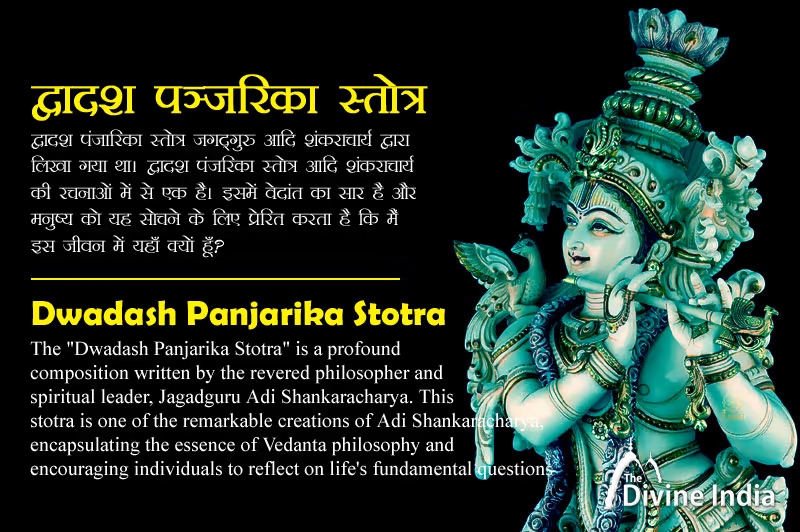


Mūṛha jahī dhanāgamatr̥ṣṇāṁ kuru sadbud'dhiṁ manasi vitr̥ṣṇām.
Yallabhasē nijakarmōpāttaṁ vittaṁ tēna vinōdaya cittam..1.
Bhaja gōvindaṁ bhaja gōvindaṁ gōvindaṁ bhaja mūṛhamatē. (Dhruvapadam)
arthamarthaṁ bhāvaya nityaṁ nāsti tata: Sukhalēśa: Satyam.
Putrādapi dhanabhājāṁ bhīti: Sarvatraiṣā vihitā nīti: . Bhaja. ..2..
Kā tē kāntā kastē putra: Sansārō̕yamatīva vicitra: .
Kasyatvaṁ ka: Kuta vastutattvaṁ cintaya iphadaṁ bhrāta: . Bhaja. ..3..
Mā kuru dhanajanayauvanagaraṁ harati nimēṣātkāla: Sarvam.
Māyāmayamidamakhilaṁ hitvā brahmapadaṁ svaṁ praviśa viditvā. Bhaja. ..4..
Kāmaṁ krōdhaṁ lōbhaṁ mōhaṁ tyvātmānaṁ bhāvaya kō̕ham.
Ātmajñānavihīnā mūḍhāstē pacyantē narakaniguṛhā: . Bhaja. ..5..
Suramandiratarumūlanivāsa: Śayyā bhūtalamajina vāsa: .
Sarvaparigrahabhōgatyāga: Kasya sukhaṁ karōti virāga: . Bhaja. ..6..
Śatrau mitrē putrē bandhau mā kuru yattana vigrahasandhau.
Bhava samacitta: Sarvatratvaṁ vājñasyacirādi viṣṇutvam. Bhaja. ..7..
Tvaya mayi cān'yatrākō viṣṇuvryarthaṁ kupyasi sarvasiṣṇu: .
Sarvasminpi paśyatmānaṁ sarvatrōtsraja bhēdājñānam. Bhaja. ..8..
Prāṇāyāmaṁ pratyāhāraṁ nityānityavivēkavicāram.
Jāpya samādhividhāṁ kurvavadhānaṁ mahadavadhānam. Bhaja. ..9..
Nalinīdalagatasaliṁ taralaṁ tadvajjīvitamatiśaya capalam.
Vid'dhi vyādhyabhimānagrasta lōkaṁ śōkahataṁ ca samastam. Bhaja. ..10..
Kā tē̕ṣṭādaśadēśē cintā vātula tava kiṁ nāsti niyantā.
Yāstvāṁ lābhāṁ sudr̥ṛhanibad'dhaṁ bōdhayati prabhavādivirōdham. Bhaja. ..11..
Gurucaraṇāmbujanirbharabhakta: Viśvādacirādbhava mukta: .
Sēndriyamānasaniyamādēvaṁ drakṣyasi nijahr̥dayasthaṁ dēvam. Bhaja. ..12..
Dśapan̄jarikāmaya ēṣa: Śiṣyāṁ kathitō hrupadēśa: .
Yēṣāṁ cittē naiva vivēkastē pacyantē narakamanēkam. Bhaja. ..13..
The "Dwadash Panjarika Stotra" is a profound composition written by the revered philosopher and spiritual leader, Jagadguru Adi Shankaracharya. This stotra is one of the remarkable creations of Adi Shankaracharya, encapsulating the essence of Vedanta philosophy and encouraging individuals to reflect on life's fundamental questions. It prompts introspection, leading one to ponder the purpose of existence and the pursuit of material wealth and family, which often leaves one devoid of inner peace. The Stotra encourages seekers to explore the truth and the higher purpose of life, guiding them toward a spiritual journey back to the divine.
The background of this Stotra's creation is notable. During his stay in Kashi, Adi Shankaracharya encountered an elderly man engrossed in studying the intricacies of Sanskrit grammar by Panini. Witnessing the old man's dedication to intellectual pursuits, Shankaracharya was moved with compassion. He realized that many people, like the old man, were consumed by intellectual and sensory pleasures, missing out on the profound practice of inner contemplation. It was this observation that inspired him to spontaneously compose the verses of the Stotra.
This set of twelve Stotras represents one of the most cherished works in our spiritual literature, traditionally recited when presenting naivedya (food offerings) to the Lord. It beautifully weaves together deep devotion, profound spiritual wisdom, and poetic brilliance, reflecting the extraordinary intellect of Adi Shankaracharya. When chanted with devotion, the Stotra becomes a captivating and soul-enriching experience. It primarily praises Lord Hari and His various manifestations while incorporating fundamental principles of philosophical thought.
The Dwadash Panjarika Stotra is dedicated to Lord Krishna. It is a tradition to recite this Stotra when offering food to the divine, signifying a request to accept the offerings. Before partaking in the meal prepared at home, it is customary to offer food to the Lord as Naivedya, expressing gratitude for the sustenance provided and seeking blessings. This act of devotion is a beautiful way to acknowledge the divine source of nourishment before consuming it.